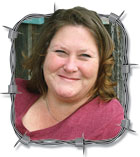 In the world of farming and ranching, we have a vocabulary all our own.
In the world of farming and ranching, we have a vocabulary all our own.
Only in agriculture can phrases and words like adjusted weaning weight, artificial insemination, linebreeding, farrowing, double homozygous and teat dip be spoken without anyone batting an eye.
There are, however, getting to be a few new phrases and words those of us involved in agriculture are becoming more and more versed in, such as animal liberators and animal rights activists.
Those groups have made up their own terminology regarding agriculture in hopes consumers will turn away from meat and animal products. Phrases such as “rape rack” are being heard more and more. Groups say this is an “industry term referring to the contraptions in which female cows and pigs are restrained while they are forcibly inseminated.” I don’t claim to know everything about agriculture, so please correct me if this statement is incorrect, but don’t think the phrase “rape rack” was in anything I learned in school or growing up around livestock. The animal rights industry likes to use the term because it conjures up thoughts of violation, loss of control and pain.
These groups have also taken terms and words common in agriculture and twisted the definitions to suit their anti-agriculture mission.
For example, a hatchery is defined by an animal rights group as a place where “virtually all chickens raised and killed for eggs, including those at so-called humane operations… at a day or two old, half of the chicks born at hatcheries are ground up alive, gassed or thrown alive into trash bags, where they suffocate to death: male chicks, who cannot produce eggs and deformed female chicks are useless to the egg industry.” Yes, the group has it’s own glossary of terms it uses to spread inaccurate information to anyone willing to listen to their claims, or read their websites.
I’ve seen tremendous amounts of online activity lately from those groups claiming they are trying to “save” animals. A small family farm in Colorado was recently targeted by such a group. A few members of the group entered the farm under the pretense of being volunteers. They asked an 8-year-old child where the chickens were housed, stole three chickens, then hurried off the property to meet up with 30 to 40 other “liberators” to lock arms and chant.
If groups want to “save” animals, I’m sure there are plenty of farmers and ranchers whose animals are suffering because of injury or illness due to natural disasters, such as wildfires, floods and hurricanes.
I would like to share a few definitions of my own:
• Trespassing: An unlawful act causing injury to the person, property or rights of another, committed with force or violence, actual or implied; a wrongful entry upon the lands of another. If you’re caught on my property without permission, you will be prosecuted and you’d better hope my Second Amendment-loving, proud military veteran husband isn’t in a bad mood.
• Family farm: A farm owned and/or operated by a family. Ninety-eight percent of the farms in the U.S. are family owned and operated farms, and are home to farmers who care about their livestock and spend countless hours caring for their animals, with few or no vacations, sick days or weather-related days off from work.
• Livelihood: The way one earns money to pay for food, a place to live, clothing, etc. If someone tries to take that livelihood away, farmers and ranchers will fight until the end because it’s their way of life, not just a job.
• Respect: A feeling of deep admiration for someone or something elicited by their abilities, qualities or achievements. Until you walked a few miles in a farmer’s boots, or ridden a horse or tractor seat for hours upon hours, show a little respect to those involved in agriculture. And just remember: no farmers, no food.
Julie





